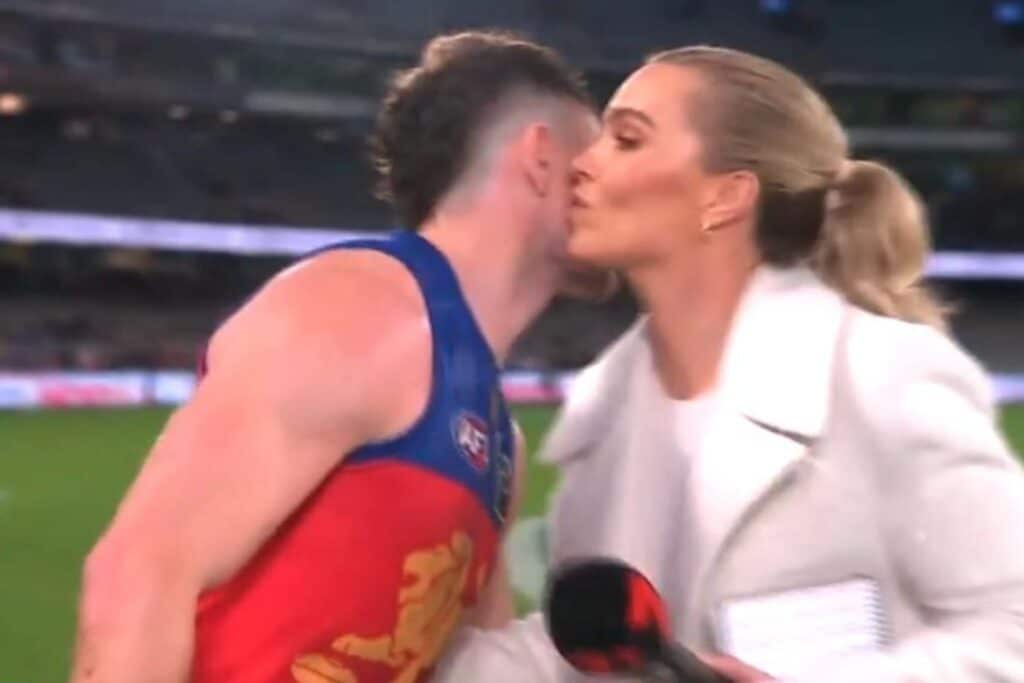The words “post-match kiss” spark memories of the 2023 FIFA Women’s World Cup final, when ex Spanish football president Luis Rubiales kissed footballer Jenni Hermoso without her consent.
But this week’s headlines using those words have been talking about a different kiss. It was a moment from Round 13 of the AFL – a week and a half ago – between AFL legend and sports commentator Abbey Holmes and Brisbane Lions co-captain Lachie Neale.
Following an interview at the end of the match between Brisbane and the Western Bulldogs, Lachie Neale leaned in for a kiss on the cheek with Abbey Holmes.
Neither Holmes nor Neale – who are reportedly friends outside of the AFL – have addressed the kiss, and it wasn’t until a week after that it started making headlines in the media, after Kate Halfpenny wrote a column in The Age.
Halfpenny posed the question about whether it was appropriate to kiss a colleague and used this moment as an example. After all, the pair were “drawing a wage” from this interview.
“Still, even if they’re besties 4 eva, when they’re both at work is it a good look to\ be saying hasta manana with a kiss? For mine, it was too familiar,” Halfpenny wrote.
“Place and time, people. You’re drawing a wage from this chat so keep it classy, San Diego.
“The incident hasn’t made waves in the media or on socials. But at a time when former Spanish soccer federation president Luis Rubiales is facing a sexual assault trial for his creepy unsolicited kiss on World Cup winner Jenni Hermoso, I think it’s worth asking the kiss question.”
There have been many moments in sport where women, both players and journalists, have been subjected to unwanted remarks or gestures from men. And these moments are certainly worth spotlighting.
In 2016, cricketer Chris Gayle overtly propositioned sports journalist Mel McLaghlin, which rightly drew public scrutiny and condemnation. Even more recently, in 2023, former reality TV contestant Chris Hughes reduced Australian cricketer Maitlan Brown to “a little Barbie” in a sideline interview.
Then of course we have the non-consensual kiss between Luis Rubiales and Jenni Hermoso after the 2023 FIFA Women’s World Cup final. Rubiales now faces a criminal trial and a potential prison sentence, should he be convicted of his charges of sexual assault and coercion.
Institutions, media commentators and even the public deemed these moments – amongst a litany of others – as ones that cross the line when it comes to sexual harassment. And in her column, Kate Halfpenny asks if this moment crosses the line too.
Like any feminist conversations, asking “the kiss question” risks backlash from certain groups who ignore, downplay or even deny the widespread issue of workplace sexual harassment. For example, one person wrote on social media in response to the debate on the recent post-match kiss: “Are we that soft as a nation that we even find this offensive?”
If we’re trying to broaden the audience and conversation on this topic, we have to know when the right time is to discuss it. And this doesn’t mean being silent on sexual harassment for the benefit of anti-woke folk, or watering down a conversation to avoid backlash. What it means is understanding what sexual harassment looks, sounds and feels like before we prematurely jump to conclusions.
For example, Luis Rubiales’ actions immediately sparked horror from the public, and it wasn’t long before Jenni Hermoso released a statement, calling out his behaviour. In the week before Kate Halfpenny’s column, we did not hear from Abbey Holmes about her kiss on the cheek with Lachie Neale. And we still haven’t heard how she felt about it.
Does focusing on an incident like this risk us missing the bigger picture on sexual harassment? Aligning the two incidents seems confusing, especially for those who are still learning about sexual harassment and what it looks, sounds and feels like. And when posing “the kiss question”, perhaps it’s best to ask the question to the woman at the centre of it first.


